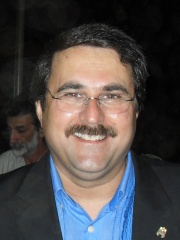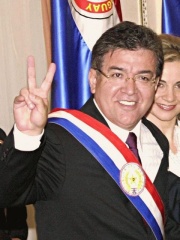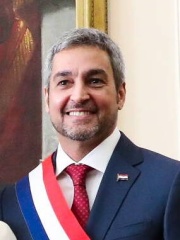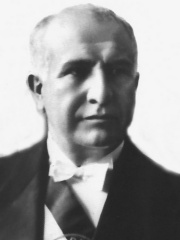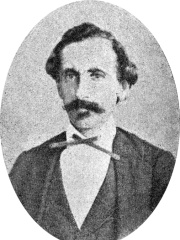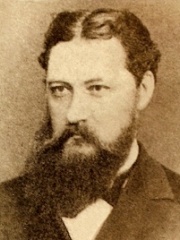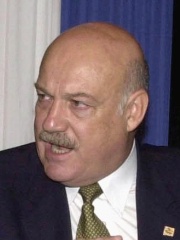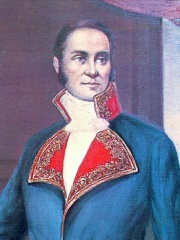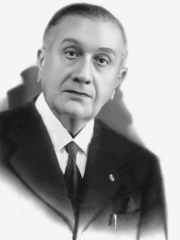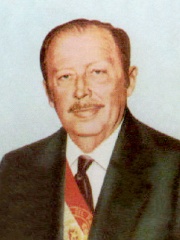
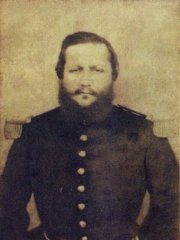
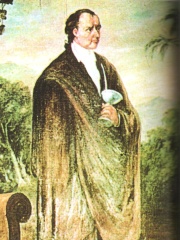
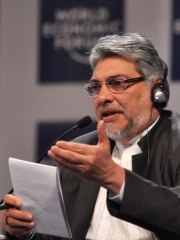
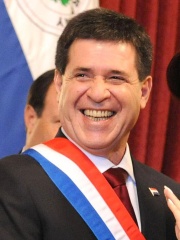
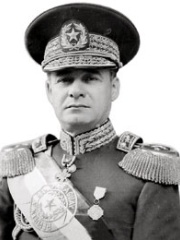
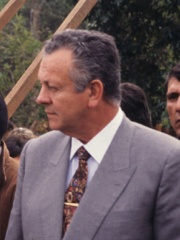
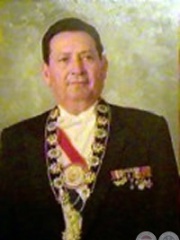
The Most Famous
POLITICIANS from Paraguay
This page contains a list of the greatest Paraguayan Politicians. The pantheon dataset contains 19,576 Politicians, 46 of which were born in Paraguay. This makes Paraguay the birth place of the 72nd most number of Politicians behind Philippines, and Libya.
Top 10
The following people are considered by Pantheon to be the top 10 most legendary Paraguayan Politicians of all time. This list of famous Paraguayan Politicians is sorted by HPI (Historical Popularity Index), a metric that aggregates information on a biography's online popularity. Visit the rankings page to view the entire list of Paraguayan Politicians.

1. Alfredo Stroessner (1912 - 2006)
With an HPI of 75.34, Alfredo Stroessner is the most famous Paraguayan Politician. His biography has been translated into 63 different languages on wikipedia.
Alfredo Stroessner Matiauda (Spanish: [alˈfɾeðo esˈtɾosneɾ]; 3 November 1912 – 16 August 2006) was a Paraguayan politician, army general, and military dictator who ruled as the 42nd president of Paraguay from 15 August 1954 until his overthrow in 1989. Known as El Stronato, his dictatorship was marked by political violence. Before his accession to the presidency, he was the country's de facto leader from May to August 1954. Stroessner rose to power after leading the 1954 coup d'état on 4 May, with backing from the Colorado Party, the Paraguayan Army, and the United States. Following a brief provisional government under Tomás Romero Pereira, he was elected unopposed in the 1954 presidential election, as all opposition parties had been banned since 1947. He quickly suspended constitutional and civil rights upon taking office on 15 August 1954. With the army and military police, who acted as a secret police, he instituted a period of authoritarian rule and violent political repression (especially of opponents, whose parties were nominally legalized in 1962). From the 1958 through the 1988 elections, Stroessner maintained power by electoral fraud. The Constitution of 1967, introduced on 25 August, permitted his re-election, and changes in 1977 effectively enabled his indefinite rule. His trusted confidant Lieutenant General Andrés Rodríguez Pedotti seized power in the 1989 coup d'état of 2 and 3 February. Stroessner was exiled to Brazil on 5 February, where he died on 16 August 2006 and was buried. His legacy continues in Paraguay, where his Colorado Party has retained power and continues to rule through clientelistic practices.

2. Francisco Solano López (1827 - 1870)
With an HPI of 71.45, Francisco Solano López is the 2nd most famous Paraguayan Politician. His biography has been translated into 42 different languages.
Francisco Solano López Carrillo (24 July 1827 or 1826 – 1 March 1870) was a Paraguayan statesman, military officer and politician who served as President of Paraguay between 1862 and 1870, of which he served mostly during the Paraguayan War (1864–1870). He is the only Paraguayan president to have been killed in action. At a very young age, he served in the Paraguayan Army fighting against Juan Manuel de Rosas in the sporadic hostilities sustained by Paraguay and Argentina during the Platine Wars. After the downfall of Rosas, he became Ambassador of Paraguay, as Minister Plenipotentiary, in several European countries from 1853 to 1855. At his return to Asunción, he was appointed Vice-President of the Supreme Government of his father Carlos Antonio López, and then assumed the presidency when his father died. He is one of only two Paraguayans to have received the rank of Marshal, along with José Félix Estigarribia. He is one of the most controversial figures in South American history, particularly because of the Paraguayan War, known in the Plate Basin as "the War of the Triple Alliance" (Spanish: la Guerra de la Triple Alianza). At least 50% of Paraguayans died during the war, numbers which made the country's recovery take decades. From one perspective, his ambitions were the main reason for the outbreak of the war while other arguments maintain he was a fierce champion of the independence of South American nations against foreign rule and interests. He was killed in action during the Battle of Cerro Corá, which marked the end of the war and of the dictatorship. He is officially recognized as the country's national hero since the presidency of Colonel Rafael Franco between 1936 and 1937 after decades of liberal governments that rejected his figure as heroic. The date of his birth, July 24, is officially recognized as the Paraguayan Army Day, while the date of his death, March 1, is officially recognized as the National Heroes' Day and is a national holiday in the country.

3. José Gaspar Rodríguez de Francia (1766 - 1840)
With an HPI of 67.23, José Gaspar Rodríguez de Francia is the 3rd most famous Paraguayan Politician. His biography has been translated into 36 different languages.
José Gaspar Rodríguez de Francia y Velasco (Spanish pronunciation: [xoˈse ɣasˈpaɾ roˈðɾiɣes ðe ˈfɾansia]) (6 January 1766 – 20 September 1840), also known as Doctor Francia or to Paraguayans of his time as Karai Guasu (in Guaraní, means "Great Lord"), was a lawyer, politician, statesman and the first dictator (1814–1840) of Paraguay following its 1811 independence from the Spanish Viceroyalty of the Río de la Plata. His official title was "Supreme and Perpetual Dictator of Paraguay", but he was popularly known as El Supremo. He was the political leader of the faction that advocated for the full independence of Paraguay from the United Provinces of the Río de la Plata and from the Empire of Brazil. Under his dictatorship, he isolated Paraguay from the external world.

4. Fernando Lugo (b. 1951)
With an HPI of 66.95, Fernando Lugo is the 4th most famous Paraguayan Politician. His biography has been translated into 57 different languages.
Fernando Armindo Lugo Méndez (Spanish pronunciation: [feɾˈnando aɾˈmindo ˈluɣo ˈmendes]; born 30 May 1951) is a Paraguayan politician and laicized Catholic bishop who was President of Paraguay from 2008 to 2012. Previously, he was a Roman Catholic priest and bishop, serving as Bishop of the Diocese of San Pedro from 1994 to 2005. He was elected as president in 2008, an election that ended 61 years of rule by the Colorado Party. In 2012, he was removed from office through an impeachment process that neighboring countries deemed a coup d'état. He was elected to the Senate of Paraguay in the 2013 and 2018 general elections but failed to win reelection in the 2023 Paraguayan general election.
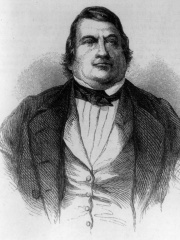
5. Carlos Antonio López (1792 - 1862)
With an HPI of 65.75, Carlos Antonio López is the 5th most famous Paraguayan Politician. His biography has been translated into 31 different languages.
Carlos Antonio López Ynsfrán (4 November 1792 – 10 September 1862) was leader of Paraguay from 1841 to 1862. Under his presidency, he undertook a process of economic and political modernization for Paraguay, and ended the isolationist policies of Paraguay dictator José Gaspar Rodríguez de Francia.

6. Horacio Cartes (b. 1956)
With an HPI of 63.05, Horacio Cartes is the 6th most famous Paraguayan Politician. His biography has been translated into 65 different languages.
Horacio Manuel Cartes Jara (Spanish pronunciation: [oˈɾasjo maˈnwel ˈkaɾtes ˈxaɾa]; born 5 July 1956) is a Paraguayan politician and businessman who is serving as president of the Colorado Party since 2023, having previously served as president of Paraguay from 2013 to 2018. Cartes owned about two dozen businesses in his Grupo Cartes conglomerate until he left the conglomerate in 2023, including tobacco, soft drinks, meat production, and banking. He was president of Club Libertad football club from 2001 until 2012, and president of the national team inside the Paraguayan Football Association during the 2010 FIFA World Cup qualification. A 2021 affidavit made by Cartes showed that his net worth was $490 million (or ₲3.6 trillion), making him one of Paraguay's wealthiest people. Cartes's politics and influence led to the creation of a political movement known as Cartismo, of which he is the central figure, which has influenced the direction of the Colorado Party and Paraguayan politics at large. Between 2022 and 2023, he was classified as "significantly corrupt" and as a result subsequently subjected to economic sanctions by the United States, which accuses him of involvement in transnational crime and terrorist organizations.

7. José Félix Estigarribia (1888 - 1940)
With an HPI of 62.39, José Félix Estigarribia is the 7th most famous Paraguayan Politician. His biography has been translated into 23 different languages.
José Félix Estigarribia Insaurralde (21 February 1888 – 7 September 1940) was a Paraguayan military officer and politician who served as the 34th President of Paraguay from 1939 until his death in a plane crash on 7 September 1940. He is most remembered for his role as commander in chief of the Paraguayan Army during the Chaco War, which resulted in an upset victory for Paraguay. He is recognized for being one of the military officers of the Paraguayan Army who led Paraguay to victory in the Chaco War against Bolivia, having been a prominent military strategist during the armed conflict and considered a war hero. During his life he reached the rank of lieutenant general, being posthumously promoted to field marshal shortly after his death. In the late 1930s, Estigarribia was courted by both the Colorado Party and Liberal Party to run for president. He decided to join the Liberals, who were more dominant at the time. As president he suspended the constitution and replaced it with a new one which gave him dictatorial powers. His authoritarian rule ended after only a year, when he and his wife were killed in a plane crash. He was succeeded by his Minister of War, Higinio Morínigo, who used Estigarribia's constitution to establish his own dictatorship.

8. Juan Carlos Wasmosy (b. 1938)
With an HPI of 61.32, Juan Carlos Wasmosy is the 8th most famous Paraguayan Politician. His biography has been translated into 30 different languages.
Juan Carlos Wasmosy Monti (born December 15, 1938) is a Paraguayan former politician and engineer who was the 44th president of Paraguay from 1993 to 1998. He was a member of the Colorado Party, and the country's first freely elected president, as well as the first civilian president in 39 years.

9. Andrés Rodríguez (1923 - 1997)
With an HPI of 61.00, Andrés Rodríguez is the 9th most famous Paraguayan Politician. His biography has been translated into 25 different languages.
Andrés Rodríguez Pedotti (June 19, 1923 – April 21, 1997) was a military officer and politician, being President of Paraguay from February 3, 1989, to August 15, 1993. He led the coup d'état on February 2 and 3, 1989, against the dictator Alfredo Stroessner Matiauda.
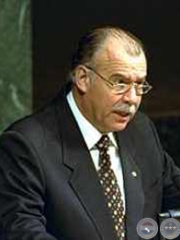
10. Raúl Cubas Grau (b. 1943)
With an HPI of 59.99, Raúl Cubas Grau is the 10th most famous Paraguayan Politician. His biography has been translated into 26 different languages.
Raúl Alberto Cubas Grau (born 23 August 1943) is a Paraguayan politician and electrical engineer who served as the 45th President of Paraguay from 1998 until his resignation in 1999. A colorado and loyal follower of Lino Oviedo, who could not run for president due to his imprisonment, Cubas was elected in 1998 alongside his running mate, Luis María Argaña, a colorado caudillo who had become Oviedo's biggest political rival. In March of 1999, large protests against Cubas' government erupted following the assassination of Vice President Argaña. As a result of these days of social unrest, which came to be known as the Marzo Paraguayo, Cubas resigned and was succeeded by the president of the Senate, Luis González Macchi. Cubas' presidency only lasted six months.
People
Pantheon has 46 people classified as Paraguayan politicians born between 1766 and 1971. Of these 46, 7 (15.22%) of them are still alive today. The most famous living Paraguayan politicians include Fernando Lugo, Horacio Cartes, and Juan Carlos Wasmosy. The most famous deceased Paraguayan politicians include Alfredo Stroessner, Francisco Solano López, and José Gaspar Rodríguez de Francia.
Living Paraguayan Politicians
Go to all RankingsFernando Lugo
1951 - Present
HPI: 66.95
Horacio Cartes
1956 - Present
HPI: 63.05
Juan Carlos Wasmosy
1938 - Present
HPI: 61.32
Raúl Cubas Grau
1943 - Present
HPI: 59.99
Federico Franco
1962 - Present
HPI: 59.90
Nicanor Duarte
1956 - Present
HPI: 59.31
Mario Abdo Benítez
1971 - Present
HPI: 57.49
Deceased Paraguayan Politicians
Go to all RankingsAlfredo Stroessner
1912 - 2006
HPI: 75.34
Francisco Solano López
1827 - 1870
HPI: 71.45
José Gaspar Rodríguez de Francia
1766 - 1840
HPI: 67.23
Carlos Antonio López
1792 - 1862
HPI: 65.75
José Félix Estigarribia
1888 - 1940
HPI: 62.39
Andrés Rodríguez
1923 - 1997
HPI: 61.00
Eusebio Ayala
1875 - 1942
HPI: 59.89
Cirilo Antonio Rivarola
1836 - 1878
HPI: 59.27
Bernardino Caballero
1839 - 1912
HPI: 59.20
Luis Ángel González Macchi
1947 - Present
HPI: 59.19
Fulgencio Yegros
1780 - 1821
HPI: 58.63
Federico Chávez
1882 - 1978
HPI: 58.61
Overlapping Lives
Which Politicians were alive at the same time? This visualization shows the lifespans of the 25 most globally memorable Politicians since 1700.

